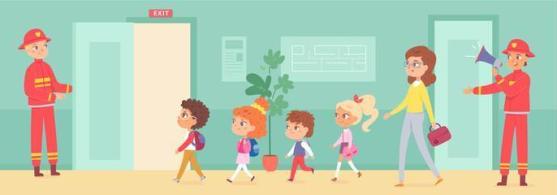Fire Safety Tips
Parents, educators, and carers must teach children about fire safety tips, if there is a fire in your home or school. Would your child know what to do?
Teaching children about fire safety at a young age is beneficial in many ways. The more they are informed, the less likely they panic if an emergency occurs.
I know we might think there will always be an adult around the child, it’s still important that children know fire emergencies so they are prepared not physically but psychologically.
I am sure we don’t want our child to panic or be scared if the situation arises. Children need to know how to react if they hear a smoke alarm
Talk about smoke alarm
Children need to understand that hearing a smoke alarm ⏰️ doesn’t always precede impending disaster. Smoke alarms often sound when there is no fire at all.
Make your child understand that a smoke alarm can go off due to smoke from cooking, candles, and the sorts, a smoke alarm can sound even when there is no fire at all
Notwithstanding, the sound of a smoke alarm should be taken seriously, even if it’s a false alarm, your children should know what to do.
Since Smoke alarms are designed to be very loud, get children to familiarise themselves with the sound as children could be frightened by loud noises so it’s best to test the fire alarm so your child knows what it sounds like
Smoke detector batteries should be changed regularly, as firefighters recommend the changing of smoke detectors batteries every time you turn your clocks ahead or back for daylight saving time
Basic fire safety tips
It’s not surprising that many children will try to hide from a fire often under the bed, in a corner, or even in a closet. By teaching them the basic fire safety tips, they will be better able to protect themselves.
Before teaching children the fire safety tips, teach children that fire spreads quickly, most fire-related deaths are not from burns but smoke inhalation.
Dangerous fumes can overcome a person in just a few minutes..so to be able to protect themselves, they must remember the following tips;
FIRE SAFETY TIPS
- Cover your mouth and nose with a wet towel or clothes to prevent smoke inhalation while evacuating
- Avoid elevators during a fire but rather locate the nearest stairway or an escape route in case of fire.
- Teach children the Stop, Drop and Roll techniques; If your clothes catch fire -stop moving, lie down, and roll, this will help put off the fire. You should demonstrate this for your children to understand and get them to do the same
- Teach them not to walk upright but should crawl under the smoke to safety, staying as low to the ground as possible(as smoke always rises) as this will help avoid smoke inhalation,also get children to practice this.
- Tell them to use the back of their hands to touch any door ( not the door knobs ) to see if it’s hot, if it’s hot they should not open it but rather find another exit.
If both exits of the room are blocked, the child should get as low as possible. Lie on the ground, near the bed if possible; that’s where firefighters will look for them
- Teach them never to re-enter the building for any reason after they are safely outside
- Show them the escape routes in case of fire and get them to practice escaping through the route from time to time. Make it fun by turning it into a blindfold game to see how fast they can escape to safety in case of fire.
- Paste emergency numbers everywhere in the house, and let them know the number so they know who to call in case they are home alone and stuck, its best to provide an emergency phone along with it as well
Fire drill at home
Having taught children fire safety tips it’s important to get them to practice it. Children have a fire drill at school and adults have them at work.
Fires are scary and could cause panic so it’s best to rehearse different situations with your family at home to better prepare them in the event of a fire at home

Plan escape route;
- Plan possible exits for each room in your house
- Best to think of two escape routes from each room in case one is on fire
- Make sure furniture and objects are not blocking the doors or windows
- Get your family to know the locations of the closest stairways or fire escapes routes and where they lead
- Practice the escape routes for each room
- Decide with the family a safe meeting place outside your house
- Practice your plan and see if everyone can be out of the house and at the safe meeting place within 3 minutes.
